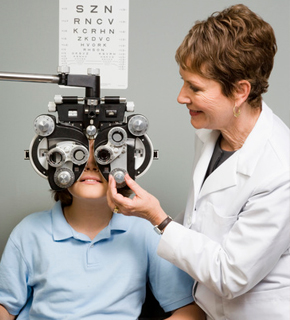A watch exam includes not only checking to ascertain if you’ll need glasses. During an extensive eye exam, we not only determine your prescription for glasses or contact lenses, we also assess your eyes’ capacity to work together together (binocular vision). The dilated portion of the comprehensive eye exam allows us look for eye diseases including glaucoma, cataract, and macular degeneration; helping us evaluate the eyes for indications of systemic disease for example diabetes, high blood pressure levels, even brain tumors. Adults and kids must have routine eye exams to help keep prescriptions current and also to search for early signs of eye diseases. Early detection can prevent vision loss.
Here is a list of a few eye conditions and eye diseases that people search for within a comprehensive eye exam:
Refractive error: This is your eyes’ “optical” prescription. You will find 3 kinds of refractive error, myopia (nearsightedness), hyperopia (farsightedness), and astigmatism (irregular shape to a person’s eye which results in two separate points of interest). Irvine Optometry may be corrected with glasses, contact lenses, and refractive surgery.
Presbyopia: Here is the eyes lack of concentration up close. This occurs as a result of the aging process. This problem may be corrected with glasses, lenses, and refractive surgery.
Amblyopia: Amblyopia is poor growth and development of central vision due to a turned eye or perhaps a large asymmetry (difference) in refractive error between the two eyes. If untreated, amblyopia can slow visual progression of the affected eye, which can lead to permanent vision loss.

Strabismus: Strabismus is definitely an eye that turns inwards or outwards in accordance with one other eye. If left untreated, a strabismus can lead to amblyopia, and decrease depth perception.
Glaucoma: Glaucoma will be the degeneration with the optic nerve (a nerve tract that connects and transmits information from your eye for the brain) often related to high eye pressures. During a comprehensive eye exam, we perform numerous tests that inform us whether or not you’ve got glaucoma. Since there are without any symptoms, you should have regular eye exams to avoid permanent vision loss.
Macular degeneration: Macular Degeneration can be a illness that affects the small “sweet spot” (macula) with the retina critical for acute central vision tasks such as reading, driving, and viewing television. An extensive examination can detect the problem ongoing.
Cataracts: A cataract is a clouding from the crystalline lens which rests just behind the colored part of the eye. Once cataracts develop patients often feel like they may be searching through a dirty window pane, which could cause the signs of glare at night.
Systemic diseases: A thorough eye exam can detect early signs and symptoms of many systemic diseases including diabetes and blood pressure levels.
To learn more about Irvine Optometrist view the best internet page.


